Do you have a question about the CLIVET WiSAN-YME 1 S 2.1 and is the answer not in the manual?
Explains symbols like WARNING and CAUTION DANGER for important information and risks.
Emphasizes compliance with regulations and use of personal protective equipment.
Stresses the importance of reading the manual for proper installation, use, and maintenance.
Outlines risks and defines the unit's intended purpose for heating/cooling water or water-glycol.
Provides CAUTION regarding outdoor installation and adherence to local regulations for systems.
Advises scheduling maintenance, handling faults, and updating product data.
Emphasizes keeping manual accessible, maintaining logbooks, and unit identification.
Highlights the presence of fluorinated greenhouse gases and warns against discharging gas.
Lists and illustrates the main components of the unit for sizes 2.1 to 3.1.
Details the hydraulic module for sizes 2.1 to 3.1, showing standard and heated versions.
Provides technical data, temperature ranges, and lists accessories supplied with the unit.
Guides on reception, storage conditions, and safe handling of the unit.
Guides on removing packaging, transport brackets, and handling the unit.
Provides dimensions and weights for various unit sizes (2.1-3.1, 4.1-8.1, 9.1-14.1).
Lists conditions for the installation site, including ventilation, safety, space, and protection from elements.
Details standard installation clearances and extreme weather considerations like wind, sun, and snow.
Guides on ground assembly, wall assembly, and lifting/positioning the unit using slings.
Explains condensate disposal and how to access internal parts, with electrical hazard warnings.
Details connecting the unit to a DHW storage tank, emphasizing proximity and pipe insulation.
Lists checks for the water circuit, including pipe material, pressure, temperature, and air vents.
Details water quality parameters for corrosion prevention and discusses water filter installation.
Provides general instructions for water piping and emphasizes system flushing for new/existing installations.
Explains frost protection needs and the use of antifreeze liquid (glycol) for outdoor installations.
Details minimum water content requirements and expansion tank control based on system size.
Details the procedure for filling the system with water, including pressure checks and air purging.
Covers essential electrical safety warnings, including circuit breakers, cable types, and earthing.
Provides precautions for electrical connections, including cable management and earth leakage circuit breakers.
Identifies control boards and shows external connection points for different unit sizes.
Details the connections for terminal blocks CN11, CN7, and CN30, listing each terminal and its function.
Explains SMART GRID management and details dip-switch settings for unit configuration.
Outlines user interface installation requirements and guides network configuration for the MSmartHome App.
Describes the functions of HMI keypad buttons and explains the meaning of display icons and indicators.
Explains how to select operation modes (Heat, Cool, Auto) and control via room thermostat.
Describes Default Temperatures and Climate Curve settings for managing temperature based on time and outdoor conditions.
Details the ECO mode for energy saving, its activation conditions, and scheduling options.
Outlines DHW functions including Disinfect, Fast DHW, Tank Heating, and DHW Pump.
Introduces Time Schedule and Weekly Schedule for automating unit operation based on time slots.
Covers options like Silent Mode, Holiday Away/At Home, Backup Heater, and Child Lock for enhanced control.
Outlines the Service Information menu, covering service calls, error codes, parameters, and display settings.
Describes how error codes are displayed and where to find a list of them for diagnosing malfunctions.
Explains how to view unit parameters and operational data, accessible via installer menus.
Provides critical safety warnings for servicemen, focusing on flammable materials and work area safety.
Details procedures for refrigerant removal, evacuation, charging, and leak detection methods.
Lists annual maintenance checks to be performed by a qualified technician, covering various unit components.
Addresses common issues like incorrect set temperature, insufficient water flow, and pump noise.
Lists error codes, their malfunctions, and the cause/corrective action for each, aiding in troubleshooting.
Explains symbols like WARNING and CAUTION DANGER for important information and risks.
Emphasizes compliance with regulations and use of personal protective equipment.
Stresses the importance of reading the manual for proper installation, use, and maintenance.
Outlines risks and defines the unit's intended purpose for heating/cooling water or water-glycol.
Provides CAUTION regarding outdoor installation and adherence to local regulations for systems.
Advises scheduling maintenance, handling faults, and updating product data.
Emphasizes keeping manual accessible, maintaining logbooks, and unit identification.
Highlights the presence of fluorinated greenhouse gases and warns against discharging gas.
Lists and illustrates the main components of the unit for sizes 2.1 to 3.1.
Details the hydraulic module for sizes 2.1 to 3.1, showing standard and heated versions.
Provides technical data, temperature ranges, and lists accessories supplied with the unit.
Guides on reception, storage conditions, and safe handling of the unit.
Guides on removing packaging, transport brackets, and handling the unit.
Provides dimensions and weights for various unit sizes (2.1-3.1, 4.1-8.1, 9.1-14.1).
Lists conditions for the installation site, including ventilation, safety, space, and protection from elements.
Details standard installation clearances and extreme weather considerations like wind, sun, and snow.
Guides on ground assembly, wall assembly, and lifting/positioning the unit using slings.
Explains condensate disposal and how to access internal parts, with electrical hazard warnings.
Details connecting the unit to a DHW storage tank, emphasizing proximity and pipe insulation.
Lists checks for the water circuit, including pipe material, pressure, temperature, and air vents.
Details water quality parameters for corrosion prevention and discusses water filter installation.
Provides general instructions for water piping and emphasizes system flushing for new/existing installations.
Explains frost protection needs and the use of antifreeze liquid (glycol) for outdoor installations.
Details minimum water content requirements and expansion tank control based on system size.
Details the procedure for filling the system with water, including pressure checks and air purging.
Covers essential electrical safety warnings, including circuit breakers, cable types, and earthing.
Provides precautions for electrical connections, including cable management and earth leakage circuit breakers.
Identifies control boards and shows external connection points for different unit sizes.
Details the connections for terminal blocks CN11, CN7, and CN30, listing each terminal and its function.
Explains SMART GRID management and details dip-switch settings for unit configuration.
Outlines user interface installation requirements and guides network configuration for the MSmartHome App.
Describes the functions of HMI keypad buttons and explains the meaning of display icons and indicators.
Explains how to select operation modes (Heat, Cool, Auto) and control via room thermostat.
Describes Default Temperatures and Climate Curve settings for managing temperature based on time and outdoor conditions.
Details the ECO mode for energy saving, its activation conditions, and scheduling options.
Outlines DHW functions including Disinfect, Fast DHW, Tank Heating, and DHW Pump.
Introduces Time Schedule and Weekly Schedule for automating unit operation based on time slots.
Covers options like Silent Mode, Holiday Away/At Home, Backup Heater, and Child Lock for enhanced control.
Outlines the Service Information menu, covering service calls, error codes, parameters, and display settings.
Describes how error codes are displayed and where to find a list of them for diagnosing malfunctions.
Explains how to view unit parameters and operational data, accessible via installer menus.
Provides critical safety warnings for servicemen, focusing on flammable materials and work area safety.
Details procedures for refrigerant removal, evacuation, charging, and leak detection methods.
Lists annual maintenance checks to be performed by a qualified technician, covering various unit components.
Addresses common issues like incorrect set temperature, insufficient water flow, and pump noise.
Lists error codes, their malfunctions, and the cause/corrective action for each, aiding in troubleshooting.











